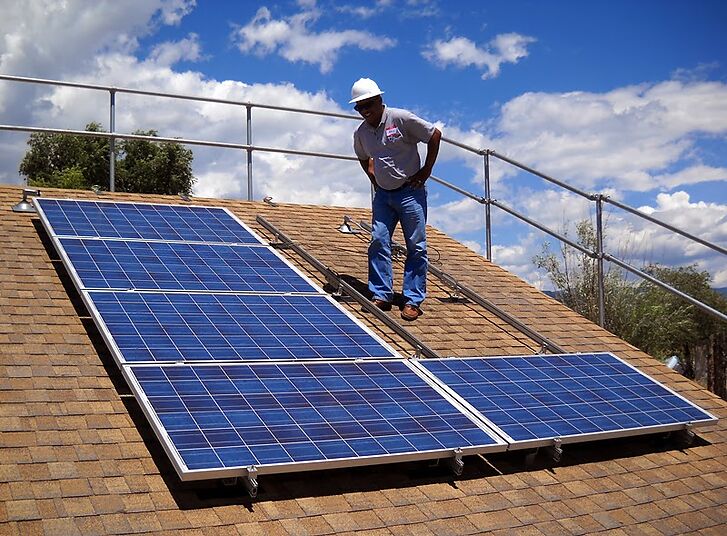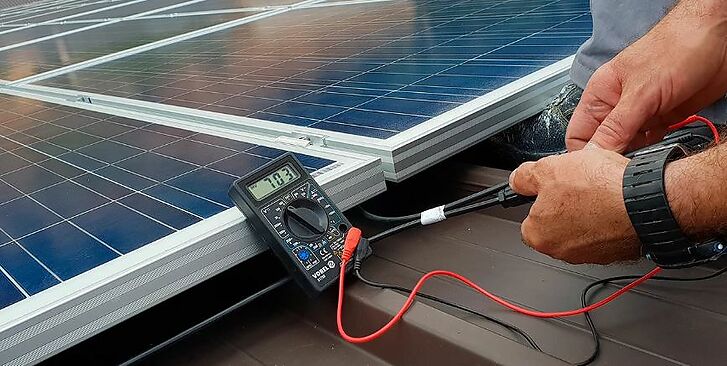Proserdom News
Back to listHow to legalize a photovoltaic installation - Procedure
Photovoltaic Panels - Energy Efficiency
HOW TO LEGALIZE A PHOTOVOLTAIC INSTALLATION?
Royal Decree 244/2019 is the regulation that regulates the administrative, technical and economic conditions of self-consumption of electrical energy. However, when legalizing a Photovoltaic Installation, more factors must be taken into account.
On the one hand, the regulations both within the Autonomous Community and locally. On the other, the power of the installation and the modality to which it is accepted.
Types of photovoltaic self-consumption:
Self-consumption WITHOUT surpluses: these are facilities that, despite being connected to the network, have an anti-spill system so as not to inject surpluses into it (in accordance with ITC-BT-40).
Self-consumption WITH surpluses under COMPENSATION: in this case, the energy surpluses are injected into the network, and compensation can be received for them in each billing period (month by month), with respect to the energy consumed from the network. To benefit from this modality, the total power of the installation must not exceed 100 kW.
Self-consumption WITH surpluses NOT included in COMPENSATION: any self-consumption that does not fall into the two categories mentioned above. As there is no simplified compensation, the surpluses can be sold in the electricity market.
It is important to be clear about the modalities, because the procedures and documentation necessary to legalize a photovoltaic installation largely depend on them.
Processing to legalize a Photovoltaic Installation
At present and thanks to the new decree, the processing of facilities is easier than before. Part of the paperwork has been eliminated and deadlines with marketers, distributors and administration have been streamlined.
1. Technical Report or Project?
We are talking about the necessary documentation in the design of the installation, which depends on its expected power and the type of network connection.
In installations up to 10 kW, we only have to present a Technical Design Report (MTD) carried out by an authorized installation company. The contents of the memory are reflected in the ITC-BT-04 of the REBT. In the case of installations of more than 10 kW, on the other hand, a Technical Project is required, drawn up and signed by a competent qualified technician.
2. Electric bulletin or CIE
This is an official document that certifies that the electrical installation meets all the requirements stipulated in the Low Voltage Electrotechnical Regulation. It is essential when legalizing a photovoltaic installation, since it is required in any case.
3. Access and connection permissions
Access permits affect those who wish to connect their new photovoltaic installations to the transmission or distribution network, having to previously obtain access and connection permits to the network.
On December 30, 2020, RD 1183/2020 on access and connection to electricity transmission and distribution networks was published, later supplemented by Circular 1/2021 of the National Commission of Markets and Competition (CNMC) .
This decree establishes the criteria and the procedure for requesting and obtaining access and connection permits to a network point. But beware, because there are also a series of exemptions for obtaining these self-consumption permits:
They are NOT necessary in the case of installations WITHOUT surpluses (of any power). You only need to request the CAU or Self-consumption code, a code that uniquely identifies your installation, made up of the 22-character CUPS plus the “A” code and three zeros. The installer can compose the CAU following this guideline (CUPS + A000) to use it in the installation certificate, or request it directly from the distributor.
Nor are they necessary for self-consumption installations WITH surpluses (with or without compensation) up to 15 kW. Be careful, in this case the generation power of the installation must be less than the maximum power of the connection (this data can be obtained in the certificate of the installation of the supply connection, or in the consumer's own contract). At least, as long as the installation is carried out on urbanized land, complying with the provisions and services required by urban planning legislation.
In all other cases, access and connection permits must be presented and guarantees must be presented. The process of access and connection to the network is carried out with the distribution company on duty, and can be carried out in most cases by telematic means, online forms, etc.
Important note: the new RD introduced a regulatory change to resolve these aforementioned powers. The installed power for the purposes of access and connection permits is the LOWER between the power installed in the photovoltaic field and the nominal power of the inverter or set of inverters.
On the other hand, if we are forced to request the access and connection point, as a general rule we will also have to deposit an economic guarantee. This is an amount that serves as a safeguard and is equivalent to €40 for each kilowatt installed.
4. Environmental and public utility authorizations
Whatever the power of the installation, we should always check with the Regional Administration on duty.
In general, for powers less than or equal to 100 kW, environmental impact or public use procedures should not be required (unless the installation site in question has some type of protection).
5. Prior administrative and construction authorizations
If the installation is less than or up to 100 kW, directly connected to LV, it is exempt from this procedure. For higher powers, consult the local administration on duty.
6. Building license and construction and works tax (ICIO)
Another of the basic procedures to legalize a photovoltaic installation, although the building license depends on the municipal regulations in question.
In some cases, a declaration of responsibility is sufficient, while in others a building license is required. In addition, the construction and works tax rate (ICIO), regulated by the Local Treasury Regulatory Law, must be paid, with discounts in this regard of up to 95%.
In the same way, some municipalities consider bonuses in the IBI.
7. Initial inspection and periodic inspections
It also depends in any case on the Autonomous Community on duty.
Generally, if our installation is executed under the REBT, an initial inspection is not necessary.
However, some facilities do require an inspection by a Control Body (OCA/EICI/ECA). In some communities, photovoltaic installations are included in the scope of "wet premises with power greater than 25 kW", which requires an initial inspection by an OCA.
8. Certificates of installation and/or completion of works
In the case of installations less than or equal to 10 kW, we only need the Installation Certificate (commonly called the Bulletin). If it is an installation of more than 10 kW, the Completion Certificate is also required.
This certificate must be signed by a competent technician, as established by the ITC-BT-04 of the REBT.
9. Operating authorization
For powers up to or equal to 100 kW, no specific procedure is required. For higher powers, the Autonomous Community must be consulted.
That is to say, except for industrial installations of a certain depth, the exploitation authorization is not necessary to legalize a photovoltaic installation.
10. Access contract
If it is a self-consumption installation WITHOUT surpluses, the installation is exempt from this procedure for any power.
In the case of self-consumption installations WITH surpluses through the internal network, at any power, they do not require a specific access and connection contract with the distributor.
Said contract is only necessary, therefore, if a supply contract for ancillary services has to be carried out, generally if the power exceeds 100 kW.
11. Energy supply contract for auxiliary services
As in the previous case, self-consumption facilities WITHOUT surpluses are exempt from this procedure.
If it is a self-consumption WITH surplus, of less than 100 kW, in the internal network and as long as the energy consumed by the auxiliary services is less than 1% of the net energy generated by the installation, they are also exempt.
Otherwise, you must have an access and consumption contract for auxiliary production services signed with the distributor.
12. Registration in the Autonomous Registry of Self-consumption
It is an ex officio procedure in the Autonomous Communities in which it exists. In the case of powers up to 100 kW they are exempt, in case of a higher power it must always be done.
13. Activity license
It only applies in the case in which the installation has surpluses, and also is not eligible for compensation. Since in this case it carries out an economic activity by selling the surplus energy on the market.
14. Registration in the Administrative Registry of Self-consumption of electricity
This procedure is carried out by the Autonomous Community, which sends the information to the Ministry electronically. That is, it is a procedure between administrators, the self-consumer should not worry about it.
15. Registration in the Administrative Registry of Electric Power Production Facilities (RAIPRE)
For installations WITHOUT surpluses, it does not apply. In the case of Self-consumption WITH surplus, it does not apply up to 100 kW. If we exceed that threshold, we must request registration in the RAIPRE through the autonomous community.
16. Market representation contract
For Installations WITHOUT surpluses or WITH surpluses eligible for compensation, does not apply. If it is a self-consumption WITH surpluses not covered by compensation, the normal thing is to formalize a representation agreement in the market with a marketer.
The other option is to sell directly in the market, for which we should carry out the procedures required by the system operator and the market operator.
AND TO LEGALIZE A PHOTOVOLTAIC INSTALLATION IN CATALONIA?
Currently, Catalonia does not have specific regulations for the processing of self-consumption facilities, whether residential or industrial. Therefore, the procedures are carried out based on state regulations.
Below are some particularities of the administrative procedure in Catalonia, in the case of legalization of self-consumption facilities.
Case a: Self-consumption generating installation WITHOUT surpluses up to 100 kW
Communication commissioning and registration in the Register of self-consumption of Catalonia. This communication complements the low voltage installation certificate.
Case b: Self-consumption generating installation WITHOUT surpluses of more than 100 kW
Application for prior administrative and construction authorization.
Provisional exploitation request for tests.
Application for definitive exploitation and registration in the Registry of self-consumption of Catalonia.
Case c and d: Self-consumption generating installation WITH surpluses WELCOME to compensation of up to 100 kW
Provisional exploitation request for tests
Application for definitive exploitation and registration in the Registry of self-consumption of Catalonia.
Case e: Self-consumption generating installation WITH surpluses NOT RECEIVED compensation of up to 100 kW
Request for provisional exploitation for tests and prior registration to the Registry of Electrical Energy Production Installations.
Application for definitive exploitation, definitive registration in the Register of Electrical Energy Production Installations and registration in the Register of self-consumption of Catalonia
Case f: Self-consumption generating installation WITH surpluses NOT RECEIVED compensation of more than 100 kW
Prior administrative and construction authorization request
Request for provisional exploitation for testing and registration prior to the Registry of Electrical Energy Production Facilities.
Application for definitive exploitation, definitive registration in the Register of Electrical Energy Production Installations and registration in the Register of self-consumption of Catalonia.


